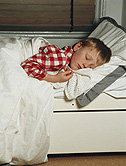- Could Your Grocery Store Meat Be Causing Recurring UTIs?
- Are You Making This Expensive Thermostat Error This Winter?
- Recognizing the Signs of Hypothyroidism
- 10 Strategies to Overcome Insomnia
- Could Artificial Sweeteners Be Aging the Brain Faster?
- Techniques for Soothing Your Nervous System
- Does the Water in Your House Smell Funny? Here’s Why
- Can a Daily Dose of Apple Cider Vinegar Actually Aid Weight Loss?
- 6 Health Beverages That Can Actually Spike Your Blood Sugar
- Treatment Options for Social Anxiety Disorder
Study Links Sleep Troubles to Children’s Mental Health


There is a link between sleep and young children’s mental health, a new study suggests.
Researchers looked at sleep patterns and the mental health of 1,000 children starting when they were toddlers. They found that those with sleep disorders at age 4 were at increased risk for mental health problems — such as anxiety and depression — at age 6. They also discovered that children with mental health problems at age 4 were at increased risk for sleep disorders at age 6.
Due to the study’s design, however, it wasn’t possible for the researchers to prove that sleep problems caused mental health issues or vice versa; the researchers could only show an association between these factors.
Insomnia was the most common type of sleep disorder. Insomnia was diagnosed in nearly 17 percent of the children at age 4 and in 43 percent of them at age 6. Insomnia increased the risk of anxiety, depression and attention-deficit/hyperactivity disorder (ADHD) at age 4 and the risk of behavioral problems at age 6, the study authors said.
Children with anxiety, depression, ADHD and behavioral problems at age 4 were also at increased risk for insomnia at age 6, the researchers said.
The findings were published recently in the Journal of Developmental & Behavioral Pediatrics.
“It is common for children to have periods when they sleep poorly, but for some children, the problems are so extensive that they constitute a sleep disorder,” study author Silje Steinsbekk, an associate professor and psychologist at the Norwegian University of Science and Technology, said in a university news release.
“Our research shows that it is important to identify children with sleep disorders, so that remedial measures can be taken. Sleeping badly or too little affects a child’s day-to-day functioning, but we are seeing that there are also long term repercussions,” she explained.
In previous research, Steinsbekk found that 4-year-olds with sleep disorders often show symptoms of mental health problems. The new study shows that this link also occurs over time and goes both ways.
It may be that both problems have similar genetic causes or share the same risk factors, the researchers theorized.
“Given that so many children suffer from insomnia, and only just over half ‘outgrow it,’ it is critical for us to be able to provide thorough identification and good treatment. Perhaps early treatment of mental health problems can also prevent the development of sleep disorders, since psychiatric symptoms increase the risk of developing insomnia,” Steinsbekk said.
More information
The U.S. National Library of Medicine has more about child mental health.
Source: HealthDay
Copyright © 2026 HealthDay. All rights reserved.










